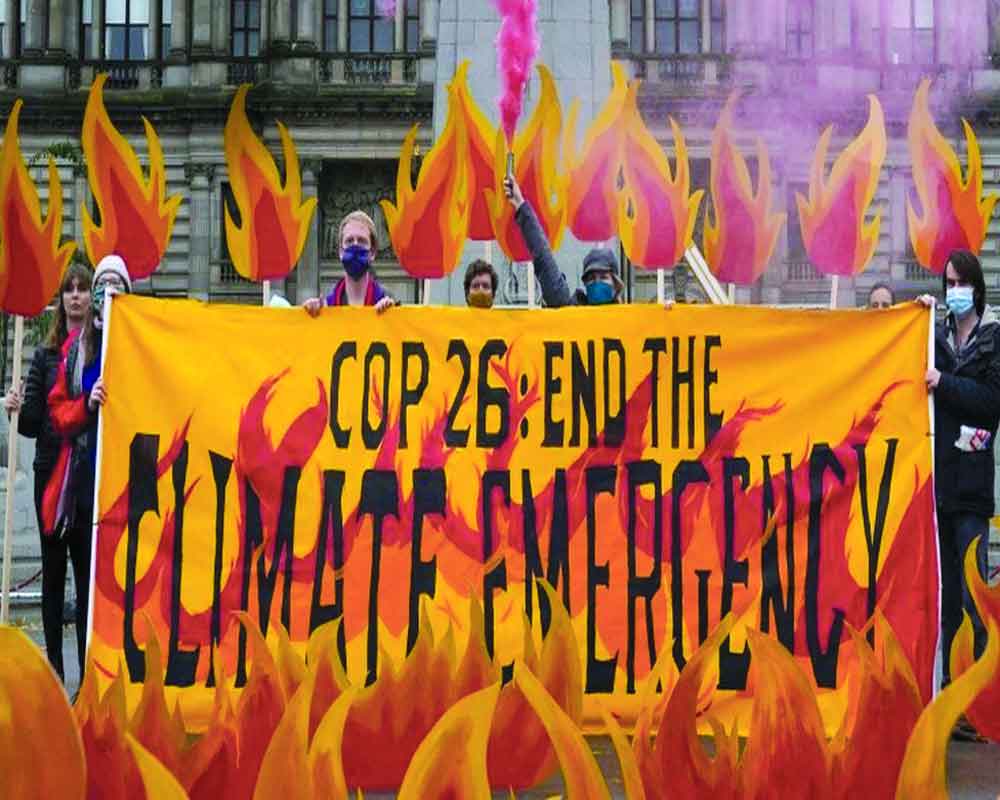If India is serious about climate change, it can ill afford to beat around the bush and play into the distraction of greenwashing, false or weak solutions
Of all the 25 Conference of Parties (COPs) that have preceded the current one, COP21 or The Paris Agreement as it is popularly known, has to be the most celebrated. It signaled a breakthrough in international climate negotiations after two decades of impasse. For a brief moment in Paris, it seemed that nations can indeed rise above their differences and deal with the defining issue of our times together. Six years after that momentous day it is abundantly clear how mistaken and naïve we were to believe in this global mirage. Global temperatures are now perilously close to the 1.5°C mark and the world is headed for a temperature rise in excess of 3°C this century which would most likely cause many ecosystems and eventually human societies to collapse.
Since India embraced the free-market economy three decades ago, it has made considerable progress in uplifting the living standards for millions of people but at great cost of its environment. India is one of the most polluted countries in the world now and can always be found at the bottom of Environmental Performance Index rankings (168 out of 180 countries in 2020). It took only a year of a natural calamity (COVID-19) to push 75 million Indians to poverty. We are looking at a future where the country will be pummeled by floods, cyclones, droughts and other extreme events on a regular basis and with increasing intensity. It would be prudent on our part to take climate change with all the seriousness that it deserves — not as a burden imposed by global climate treaties but as a genuine measure to safeguard the country's wealth and citizenry.
If India is to be serious about tackling climate change, it can ill afford to beat around the bush and play into the distraction of greenwashing, false or weak solutions. India has already joined the bandwagon by borrowing flimsy concepts like emissions intensity and carbon sinks in its Nationally Determined Contributions (NDCs). The new fad is Net-Zero and many think-tanks are busy telling us whether India should become net zero in 2060 or 2070 even when the fate of the planet will largely be decided in the next nine years. India is set to meet its target of reducing the emission intensity of its GDP by 33 to 35 per cent by 2030 from the 2005 level and it will most probably achieve the target 40 per cent cumulative electric power-installed capacity from non-fossil fuel-based energy resources too.
But these are merely percentages which means the absolute emissions will still be high as India's energy demand skyrockets. Most of the climate action measures being taken in India and indeed around the world (even if well-intentioned) are like putting band-aids on a leaking cauldron with multiple holes, that too from inside. It is not the band aids that needs to be tweaked but the cauldron (read flawed economic system) needs to be changed altogether.
Climate leadership is not about organizing massive global conventions, making lofty promises or paying large amounts of money while still perpetuating the same systems that is causing global warming. Sadly, the history of COPs shows that it has become PR event where the powers that be talk about everything but the root cause of the problem. Can India break this climate politeness in COP26 and become a genuine climate leader by doing the hard but indispensable talk around a flawed economic system that is incompatible with planetary health and security. Can it challenge the macrostructures that cause unsustainability — limitless growth, insatiable consumerism, wanton exploitation of land and labour — and exhort the world to reimagine progress and development. There are no indications whatsoever of such a radical change in the mindset of our political and economic masters. In fact, we are in a race to the bottom as we continue to dilute environmental protections and social safeguards in the pursuit of temporary progress and permanent ruin.
A stable climate is what makes life possible on Earth. Overconsumption — the structural imperative of the dominant economic system in the world threatens this vital stability. Lack of climate action since the last three decades means we have to race against time to control the damage. The time for finger-pointing is well and truly over and COP26 talks that overlooks the fundamental problems of a rapacious economy is nothing but headline-grabbing band-aids or as the young climate activist Greta Thunberg puts it — 'blah blah blah'.
(The writer is Project Officer, Climate Justice, Oxfam India. The views expressed are personal.)


























